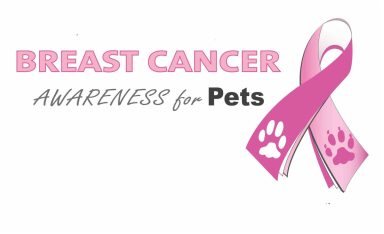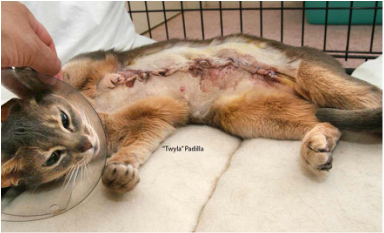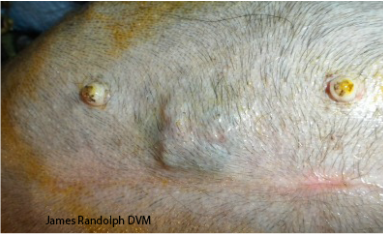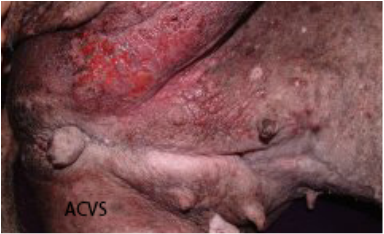Breast Cancer
WHAT HAPPENS: Almost 10% of women in the US will develop some type of breast tumor. In unspayed female dogs, 25% (1 out of every four!), will develop mammary (breast) tumors. Genetics, breed, hormones and obesity all play roles in the development of mammary tumors. It's much less common, but males (human and animal alike) can also get breast cancer.
DIAGNOSING: We cannot determine if a tumor is benign (relatively harmless) or malignant just by looking at or feeling it. Malignant tumors can be locally aggressive (if not completely removed, they grow back) or metastatic (they spread to other parts of the body.)
Using a needle to retrieve cells (FNA-fine needle aspirate) is simple, but may not be accurate. Blood-work to assess overall health and chest x-rays to check for tumor metastasis to the lungs are the first steps before surgery.
TREATMENT: Surgical excision is the primary treatment for mammary tumors. Surgery also allows a more accurate diagnosis. A pathologist can look at the tumor and identify what type it is and how likely it is to be benign or malignant. Depending on tumor type, radiation or chemotherapy may also be recommended by an oncologist.
COMPLICATIONS: In dogs, 50% of mammary tumors are malignant. Unfortunately, in cats, 85% of mammary tumors are malignant. A less common form of mammary cancer is inflammatory carcinoma. This can look like a severe, painful, infected rash and has an extremely poor prognosis.
Large tumors can become infected or irritated from rubbing on the ground and animals will often chew at the tumors. Some animals also have other health conditions that make them risky anesthetic candidates.
PREVENTION: Early spay virtually eliminates breast cancer in dogs and cats! Spaying before the first heat cycle (their first "period") reduces breast cancer by more than 90% in cats and 99% in dogs! Spaying before the 3rd heat cycle still has some preventive effects.
Because 50% of mammary tumors have estrogen and progesterone receptors and because spaying at any age eliminates the risks of pregnancy, uterus infection and ovarian cancers; it is usually recommended that if an animal has not been spayed at the time of mammary surgery, she should be spayed at the same time.
Tumors that are removed when they are small generally have a better prognosis. The more times abnormal cells divide, the more likely they are to develop even more mutations and become more malignant. Don't wait!
---Meredith Weltner-Sharin VMD
Mammary Tumors in Dogs- Veterinary Partner
Mammary Tumors in Cats- Veterinary Partner
Mammary Tumors in Dogs- Pet Health Network
Mammary Tumors in Cats- Pet Health Network
Mammary Tumors- ACVS





 RSS Feed
RSS Feed



